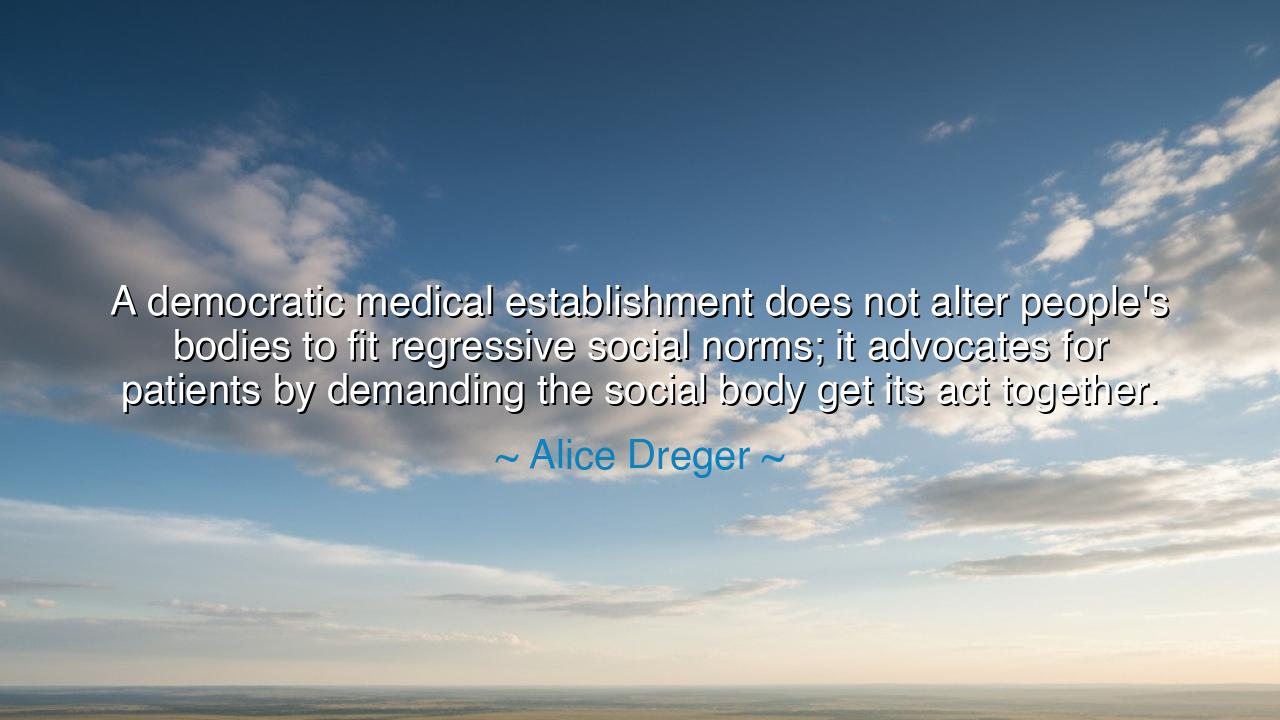
A democratic medical establishment does not alter people's bodies
A democratic medical establishment does not alter people's bodies to fit regressive social norms; it advocates for patients by demanding the social body get its act together.






The words of Alice Dreger—“A democratic medical establishment does not alter people's bodies to fit regressive social norms; it advocates for patients by demanding the social body get its act together”—strike with the force of moral thunder. They are not merely a statement about medicine, but a declaration about justice, dignity, and the sacred duty of truth in the face of conformity. In these words lies an ancient principle reborn: that the healer’s highest allegiance is not to the customs of society, but to the well-being and humanity of the individual. Dreger’s warning is timeless—that when medicine serves prejudice rather than principle, it ceases to heal and begins to harm.
To understand the depth of this teaching, one must first grasp what Dreger means by a democratic medical establishment. She speaks of a system in which medicine is guided by reason, compassion, and equality, not by the dictates of power, fashion, or fear. In such a system, doctors are not tools of cultural conformity—they are advocates for truth and defenders of those most vulnerable to society’s narrow definitions of “normal.” But when medicine becomes enslaved to regressive social norms, it transforms from a sanctuary of care into an instrument of oppression. Dreger calls upon physicians to stand not as servants of the mob, but as guardians of conscience, demanding that it is society—not the patient—that must change.
History is filled with examples of the very danger she warns against. In the nineteenth and twentieth centuries, medicine too often sought to reshape the human form to fit social expectations rather than challenge them. Women who defied gender roles were diagnosed with “hysteria.” Left-handed children were forced to retrain their hands, as if their natural form were an illness. Intersex infants—born with bodies that did not fit conventional definitions of male or female—were subjected to surgeries designed to “normalize” them, not for their own health, but to soothe society’s discomfort. These acts were not medicine—they were acts of conformity disguised as care. They treated not the patient’s pain, but the fear of those who could not bear difference.
There is a powerful historical parallel in the story of Dr. Ignaz Semmelweis, the physician who discovered that handwashing could prevent deadly infections in mothers. His colleagues ridiculed him, for his findings challenged the pride and traditions of the medical establishment. They preferred to cling to their customs rather than accept a truth that demanded change. In this, we see the same pattern Dreger condemns: a society that insists the individual must conform to its comfort, rather than the collective confronting its own failings. Semmelweis paid for his defiance with exile and death—but his legacy endured, proving that the healer’s loyalty must always be to truth, never to the convenience of the crowd.
Dreger’s words also hold a mirror to our age. Even now, in the modern world of dazzling technologies and boundless data, the temptation remains for medicine to bow before social pressure. The pursuit of beauty has become a billion-dollar industry, convincing many to alter their bodies to meet artificial ideals. Children who express difference are often met not with understanding, but with intervention. And in the face of disability, society too often demands correction instead of acceptance. But Dreger reminds us that real progress does not mean forcing bodies to fit the world—it means transforming the world to fit humanity. The ethical physician must not be an agent of adjustment, but an architect of justice.
This truth is ancient. The Hippocratic Oath, sworn by physicians for over two millennia, commands: “First, do no harm.” Yet harm is not always the wound of the blade—it is also the wound of neglect, prejudice, and silence. The democratic healer must speak where others stay silent, must question what others call “normal,” and must defend the right of every human to exist as they are. Just as a wise gardener does not prune every tree to look the same, the wise doctor nurtures the diverse forms of life that nature has created. The duty of medicine is to heal the body without betraying the soul.
The lesson of Alice Dreger’s words is both moral and practical: the truest healer is one who refuses to make the patient conform to a broken world. Each of us, whether physician or not, carries a part of that duty—to stand against the pressures of conformity, to see the sacred worth in every form of human life, and to challenge the structures that demand uniformity over truth. Progress is not the perfection of the body, but the elevation of compassion.
So, my child, remember this teaching when you encounter the unfamiliar or the misunderstood. Do not ask, “How can this person change to fit the world?” but ask instead, “How can the world grow to make space for this person?” For only when the social body learns to heal itself—when prejudice yields to empathy, and ignorance to wisdom—will medicine fulfill its noblest purpose: not to reshape humanity, but to honor it in all its sacred diversity.






AAdministratorAdministrator
Welcome, honored guests. Please leave a comment, we will respond soon